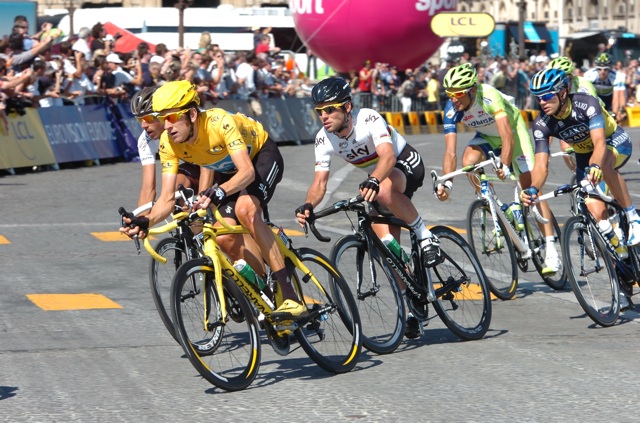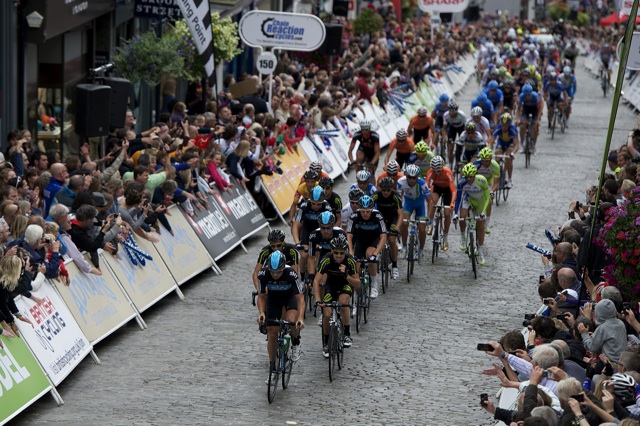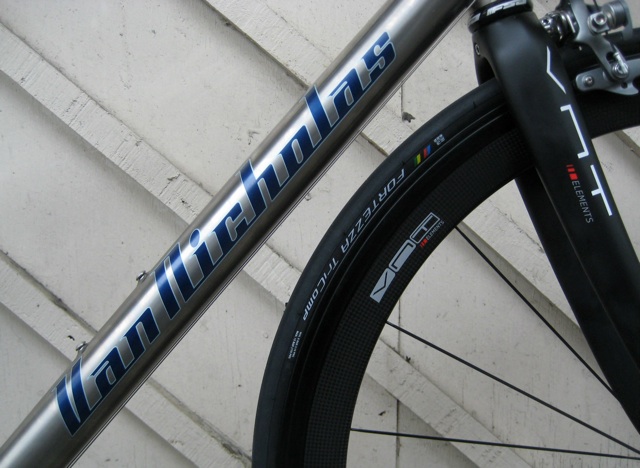Bradley Wiggins thinks Mark Cavendish may have to leave Team Sky to fulfill his potential.
His argument, well intentioned, is that Team Sky will now focus on taking the overall prize at Grand Tours, not stage wins and points competitions.
Wiggins says he has enjoyed working with Cavendish and speaking for himself would rather he stayed. Few will question his sincerity.
But is leaving Team Sky the best way for Cavendish to fulfill his potential?

Given the obvious harmony in the camp, a ‘friends reunited’ for British Cycling’s most glittering alumni, staff and riders included, the world champion would leave only to increase his chances of success on the road. Which other team could do that?
Omega Pharma-QuickStep is the outfit considered most frequently mentioned in connection with Cavendish should he leave Team Sky. The connection is Brian Holm, the world champion’s directeur sportif at the defunct HTC-Highroad squad, and now in the same role with the Belgian squad. General manager, Patrick Lefevere, has also made no secret of his willingness to sign the Manx Missile.
This option makes little sense, however, for a rider seeking to be the sole leader of a team prepared to define its success by his own. OMQS already has two leaders: Tom Boonen for the Classics and Levi Leipheimer for the Grand Tours. Boonen’s emphatic success and Leipheimer’s lack of top drawer performances (admittedly in an injury-hit season) suggests that the heart beat of this Belgian squad is its Belgian captain, winner this year of all Belgium’s biggest races, a pleasing outcome presumably for its Belgian sponsors. How would Cav fit into that particular jigsaw?
Which other of the peloton’s ‘superteams’ could offer a rider of Cavendish’s ability an adequate berth, for surely only they could afford him?
Not perhaps BMC Racing, whose own attempt this year to cover all bases with Cadel Evans and Philippe Gilbert yielded precisely nothing, despite the valiant efforts of both. (The team will surely now refocus its efforts on Van Garderen and Phinney). RadioShack-Nissan-Trek, with general manager, Johan Bruyneel fighting proceedings from USADA, and the Schleck brothers in disarray, Andy through injury and Frank through doping allegations, hardly looks like a stable unit.
BMC’s failure casts a revealing light on Team Sky’s success. Cavendish, lest we forget, has nine victories this year, including three stage wins each in the Giro d’Italia and the Tour de France. Critics highlight his diminished return from the Tour this year from last. But the nature of sport, and especially at the level at which Cavendish competes, is that success is not (a) given, a fact of which Cavendish will be keenly aware having prepared meticulously for Milan-San Remo and the Olympic road race, and suffered disapointments in both.
Cavendish scored three stage wins at the Tour with the team riding for Wiggins, but the same total at the Giro when the team rode for him. He was unable to clinch the Giro’s points jersey either, despite an admirable ride to Milan when many observers expected him to abandon to prepare for the Tour and the Olympics. The results suggest that racing in is not infinitely controllable; that even given the support of a team, it’s impossible to win every time. This isn’t to suggest it shouldn’t be attempted (it’s the view of this correspondent that Team GB pursued the correct strategy in the Olympic road race) only that winning isn’t easy, far less guaranteed; if it was, we’d all do it.
Dave Brailsford spoke immediately after Wiggins’ Tour victory of a team that would dominate Grand Tour racing. Lining up his troops behind Cavendish on the flat and Wiggins in the mountains would be one way to achieve that. Were we offered a glimpse on stages 18 and 20 of the Tour? Let’s hope so. The sight of a British world champion winning for a British team in the word’s biggest races this season has been a pleasure.





